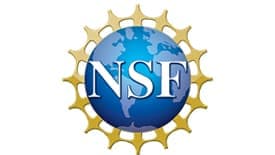UNC Charlotte students awarded prestigious NSF graduate fellowships

Three UNC Charlotte students have received National Science Foundation (NSF) Graduate Research Fellowships (GRF) for 2015; this brings the total number of NSF GRF students produced by UNC Charlotte to 20.
“The NSF Graduate Research Fellowship Program is a highly prestigious award that recognizes and supports outstanding graduate students who are pursuing research-based master’s and doctoral programs,” explained Tom Reynolds, associate provost and dean of the Graduate School. “These are the students enrolling in the top graduate schools in the country, so our success is clear evidence of the quality of education at UNC Charlotte.”
The three recent awardees are:
- Jonathan Knighten, who is completing a Bachelor of Arts in Computer Science and Bachelor of Arts in Mathematics. He plans to pursue a doctoral degree at Cornell University. Jamie Payton, an associate professor in the College of Computing and Informatics Department of Computer Science, is his research advisor.
- Kathryn Smith, who completed a bachelor’s degree in electrical engineering at UNC Charlotte in 2013. She is completing a master’s degree this semester and has been accepted in the electrical engineering doctoral program. Smith is the University’s first electrical engineering NSF GRF recipient. Her advisor is Ryan Adams in the Department of Electrical and Computer Engineering, Lee College of Engineering.
- Jennifer Kassel, who is completing a Bachelor of Science in Physics and has had several offers from schools across the country. Michael Walter, an assistant professor in the College of Liberal Arts & Sciences Department of Chemistry, is her advisor.
Knighten and Kassel participated in the University’s Charlotte Research Scholars (CRS) summer program. As part of the Charlotte Research Scholars’ professional development program, the NSF competition is discussed and encouraged. They are the first two students cultivated by CRS to receive NSF GRF awards.
In addition, three students received honorable mention. They were:
- Patrick Quinlivan, who received a bachelor’s degree in chemistry in 2013; he is attending Columbia University. Another CRS participant, Quinlivan was advised by Dan Rabinovich, professor of inorganic chemistry.
- David Townsend Smith, who completed a bachelor’s degree in chemistry in 2012 and is attending the University of Arizona. While at UNC Charlotte, he worked with Craig Ogle, professor of chemistry and director of the Regional Analytical Chemistry Laboratory.
- Marissa Styron, who received a bachelor’s in chemistry in 2013 and is currently a nanoscale science doctoral student at the University. She received the Graduate School’s 2013-14 Everett Foundation First-Year Doctoral Fellowship. Rabinovich is her advisor.
NSF GRF awardees receive a $34,000 annual stipend for three years within a five-year fellowship period. They also receive a $12,000 cost-of- education allowance, which is paid to the graduate institution.
In its 60-plus years, the NSF has awarded more than 50,000 fellowships in a wide range of disciplines, including engineering, life sciences, economics, social sciences, psychology, mathematical sciences, physics and astronomy, chemistry, geosciences, computer and information science and engineering, STEM education and learning research and materials research. To date, 40 NSF fellows have gone on to become Nobel laureates.
For additional information about NSF and other financial opportunities available to graduate students, visit the Graduate School website.